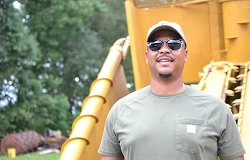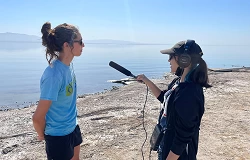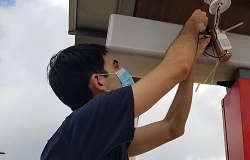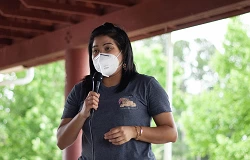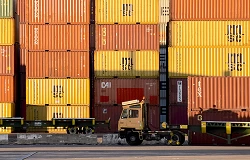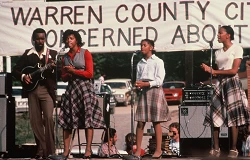Seeking Justice: On Repeat, In Every Language, Unceasingly
For this final Living Downstream episode of the season, we're dropping in on three recent webinars: One gathering considered Social and Environmental Justice at Upaya Zen Center in New Mexico. Another knitted together poetry and a powerful environmental film. It was put on by the Geraldine R. Dodge Poetry Program. And a third event was cheekily called Toxics are a Drag, and was billed as a panel discussion on toxic beauty products in the queer community. That was hosted by one of the most important grass roots environmental groups in the country: New York City's WEACT for Environmental Justice. Find more information about all these events in the Resources section of our website at https://norcalpublicmedia.org/resources/living-downstream-resource-guide First, this show has an update on what's happening right now, the last week of October…
Health, Wealth and Race in Today's Louisiana
This season, we’re looking at environmental racism across the country, and today that takes us to the sugarcane covered, oil-rich region at the intersection of southern Louisiana and the Gulf of Mexico: Iberia Parish. In this episode of Living Downstream, we will hear from people who say they are fighting over something that their families have already fought for generations to maintain: wealth. In this case, we’re talking about land: what grows on it and what lies under it. We’ll hear from Black sugarcane farmers who say it’s become impossible to stay within the industry. These farmers describe the challenges of keeping their businesses afloat in an atmosphere of overwhelming racism, and they share with us how the stress is affecting their minds and bodies. And we'll hear the poignant story of a woman who documents how oil was taken…
The Sea Next Door
From Northern California Public Media and Mensch Media, this edition of Living Downstream is guest hosted by Molly Peterson. This time, from the Coachella Valley, east of Los Angeles, we’re talking about the biggest lake in California — now starved of water — and the people who live around The Sea Next Door. The Salton Sea sits in a depression of land 30 miles from the Mexican border — and it poses a growing threat to public health. In this episode, two young women from the Eastern Coachella Valley introduce us to their neighbor. We begin with Adriana Torres, who lives in a rural community there: an area called North Shore. We'll also hear from her classmate Rosa Gonzalez.
The Little Town That Would Transform the World
On this episode of Living Downstream, we take you to a little city with big plans for changing the world. While we’re there, we ask what role local governments can play in the movement for climate justice — that’s where climate activism and the fight for social justice meet. Ithaca, New York sees itself as a living laboratory for climate justice. Climate justice is based on the recognition that the people whose lives are most disrupted by climate change — the people who tend to die in the storms and heat waves, or to lose their homes in the fires and floods — are generally the people with the least money, the most precarious jobs, the least access to health care, the shabbiest housing, and the least reliable transportation. So if you want to do something about the climate emergency, the thinking goes, you can’t just focus on things like…
Degrees of Injustice: The Social Inequity of Urban Heat Islands
On this episode of Living Downstream, Texas Public Radio’s Yvette Benavides takes us to Central and South Texas where summer days are frequently in the upper 90’s, but where in many low income neighborhoods the mercury climbs even higher. And with climate change, these areas will be experiencing more extreme temperatures, more frequently and for longer durations. New research shows how these hotter temperatures are taking a toll on the people who live in some city neighborhoods — typically in communities of color. The heat is affecting their bodies and minds — effectively shortening their lives. We'll be hearing from some Spanish-speaking residents as they explain how they coexist with the heat. Yvette will translate, but we’ll make room for these Texans to have their voices heard in their own language. What's the connection between…
Chicken Country, North Carolina: Justice on the Factory Floor
On this episode of Living Downstream: The Environmental Justice Podcast, Victoria Bouloubasis visits a rural county where the multicultural workforce kept America fed during the pandemic. We'll meet Esmeralda, who has become a community health worker, and her mother Marta, who works in a poultry plant. In the face of blatant mistreatment and inadequate protection, food factory workers in North Carolina became sick, and died, in unacceptably high numbers. This mother-daughter team stepped up to protect the health of their neighbors and coworkers, efforts they continue today.
West Oakland's 'Diesel Death Zone'
For decades, community members and allies have complained about the diesel truck traffic around the Port of Oakland. People who live in this neighborhood, between several freeways and backing up to one of the busiest ports in the nation, have elevated instances of asthma, and shorter life spans, than others in the county. We meet the activists who are trying to change this reality, and we hear about the complex politics and alliances that have resulted in some hope that change is coming. The phrase "diesel death zone" is used more often with areas in Southern California, but we believe it applies here as well. Sarah Holtz reports.
Generations in Houston's 5th Ward Contend With Contamination, Cancer Clusters
On this episode of Living Downstream, we visit Houston's Greater Fifth Ward, to learn how creosote contamination has degraded the health of people living near a rail yard. We talk with residents, who describe all the cancer cases in the neighborhood and with Dr. Robert Bullard, widely considered the father of environmental justice. Residents have organized to advocate for compensation from the railroad company that owns the yard. What will stay with you is the story of "Mister" — a young neighborhood resident who dreams of becoming a veterinarian. Laura Isensee reports.
New Growth in the Birthplace of Environmental Justice - Encore
The 40th anniversary of PCB protests in North Carolina is about to be commemorated. To mark the occasion, we revisit one of the most listened-to episodes from our first season. This story comes from Warren County. In the early 1980s, Warren County became a flash point in the fight for something that didn’t even have a commonly used name at the time: environmental justice. These days, members of this community are not only marking that history, they are taking new approaches to raising environmental awareness. Their work begins with support for small farmers, particularly those of color. Jereann King Johnson and Joe O’Connell have teamed up to tell the story of local environmentalism in the present day. As we continue this second season of Living Downstream, make sure to subscribe, wherever you get your podcasts. Please leave comments and…
Catherine Coleman Flowers: Warrior for Environmental Justice
On this episode of Living Downstream, we meet Catherine Coleman Flowers. In 2020, she released her first book, Waste: One Woman's Fight Against America's Dirtiest Secret. The book documents her two-decade crusade to expose the shameful conditions that many of her Alabama neighbors endure. Some Americans take for granted that when they flush the toilet their waste will travel to a place where it can be safely and effectively treated. But for others, the sewage may go only as far as their back yards, to become breeding grounds for insects and disease. In 2020, Flowers became a MacArthur Foundation Fellow - an award colloquially known as the "genius" grant for her work in Alabama and around the world. She also is the founder of CREEJ, the Center for Rural Enterprise and Environmental Justice, and a current vice chair of the White House…
Struggling to Breathe in the Bronx
More than a year into the pandemic, the Bronx is still the New York City borough with the highest death rate from COVID-19. That's where we begin the second season of our Living Downstream podcast. Last year, Ese Olumhense, former Bronx reporter at THE CITY, explored why residents there were dying…
Living Downstream Podcast: Season 2 Preview
Season 2 of Living Downstream: The Environmental Justice Podcast premieres Earth Day (4/22/21). Producers are checking in from around the country, from California to North Carolina. And we'll talk with EJ warrior Catherine Coleman Flowers. Here's a preview.
'Living Downstream' Exposes Agent Orange Plight in Florida
Last year we brought you the story of civilian workers at Eglin Air Force Base in Florida, who tested the defoliant Agent Orange during the Vietnam War. Today these workers are in their 70s and 80s and suffer from the same diseases that Vietnam veterans have shown were caused by their exposure to…
Environmental Justice for Non-Recognized Tribes
Non-Federally Recognized Tribes Struggle to Protect Environmental and Cultural Assets By Debra Utacia Krol and Allison Herrera Read more about federally non-recognized tribes. Valentin Lopez was handed a dilemma: how to honor his elders’ admonition to fulfill an ancestral directive to guard and…
Firing Forests to Save Them: Could Native Traditions Save Lives?
When we imagined a podcast about environmental justice – it was before the Tubbs fire here in Sonoma County – and the deadly fire seasons of 2017 and 2018. Even so, we wouldn’t have thought of Indians and their relationship to fire as a matter of environmental justice. But producers Allison Herrera…
Living Downstream: The Klamath Water Wars
This is the story of a 15-year conflict over what would be the biggest dam removal ever, a modern cowboys and Indians tale that shows how victories for Native American rights still come with fits of racism and armed conflict, and how rural folks learned to make peace (and collaborate on an…
Living Downstream Visits Birthplace of Environmental Justice
This story comes from Warren County, North Carolina. In the early 1980s, Warren County became a flash point in the fight for something that didn’t have a commonly used name at the time: environmental justice. These days, members of this small, “majority-minority” community are taking new approaches…
Fire and Rain: Living Downstream Reports from Borneo
The peat swamp forests of Borneo are the site of a failed agricultural experiment. Planners believed that rice should grow in the swamps, but it couldn't. Even today, experiments with growing oil palms and other trees are changing the forests, with little positive to show for these efforts. As…
Trailer Park Activists of Coachella Valley Fight for Health
You may be familiar with Coachella from hearing about the annual music festival there. But for 10 years, journalist Ruxandra Guidi has been visiting farmworkers in the area, learning about the deplorable conditions in which they live. There’s now some hope that community health workers are making a…
Uranium: A Toxic Legacy at Red Water Pond Road
For the Navajo people Mother Earth is sacred. She places her mineral riches below ground. That’s where they’re meant to stay. If the Earth’s elements are hauled up to the surface, Navajos believe they can turn monstrous -- or they can unleash the monsters in humankind. Uranium mining produces…
Smackdown: City Hall vs. Big Oil
"Smackdown" tells the story of Richmond California, a working class town that grew up in the shadow of a massive Chevron refinery. The refinery emits a toxic soup of chemicals and residents suffer an asthma rate that is double the national average. Explosions and fires have periodically shaken the…
Forgotten Civilians of Eglin Air Force Base
During the Vietnam War the U.S. military defoliated large swaths of Vietnam with Agent Orange to deprive enemy forces of jungle cover. In the process it exposed American soldiers to this toxic chemical as well. Our own civilians back in the U.S. were also exposed to Agent Orange, along with other…
Preview: Living Downstream Addresses Environmental Justice
Here's a preview of our 12-part podcast, featuring stories from California and the rest of the country (and the world). We're doing a deep dive on environmental justice issues. The timing couldn't be better, as the media is now turning its attention to this issue with full force. Most recently, the…
Living with Lead: Public Housing on a Superfund Site
In East Chicago, Indiana, authorities built a public housing project on land once occupied by a lead smelting operation. The area has been declared a Superfund site, and residents of the housing project, but not the surrounding area, have been moved. After we produced this episode of our podcast,…

 Live Radio
Live Radio

